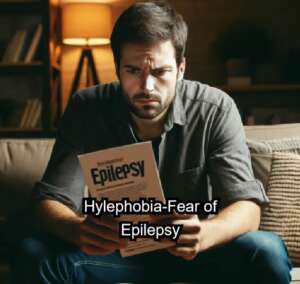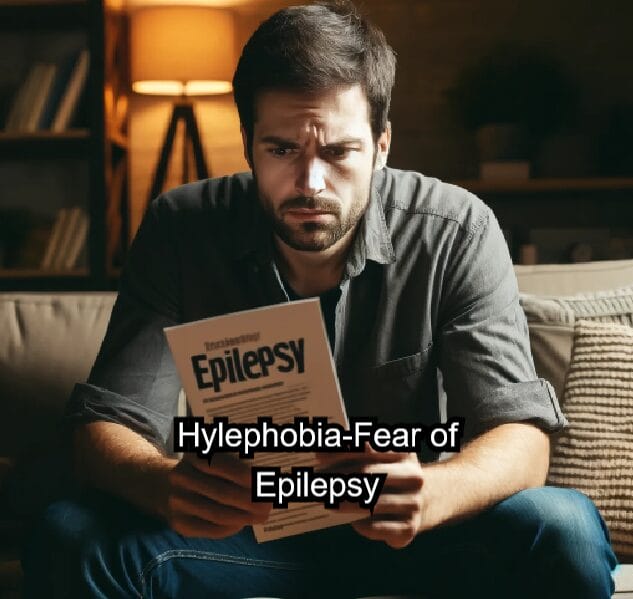Share This Article
Hylephobia: Look to Understand the Fear of Epilepsy
Hylephobia, the fear of epilepsy, is a less commonly known phobia but can be deeply troubling for those who experience it. This specific phobia involves an intense, irrational fear of witnessing an epileptic seizure or being diagnosed with epilepsy oneself. For someone with hylephobia, the mere thought of epilepsy can trigger severe anxiety and avoidance behaviors, significantly impacting their daily life and interactions.
What Is Hylephobia?
Definition: Hylephobia is the intense fear of epilepsy, particularly of witnessing seizures or suffering from them.
Impact: This fear can cause individuals to avoid situations where they might encounter someone with epilepsy or excessively worry about developing the condition themselves.

How One May Develop Hylephobia
Traumatic experience: The phobia often originates from witnessing a severe epileptic seizure, which can be a frightening experience, especially if it was unexpected or involved a loved one.
Misinformation and lack of understanding: Misunderstandings about epilepsy and seizures contribute to the development of hylephobia. Myths and stigma surrounding epilepsy can enhance fear and anxiety.
Personal health anxiety: For some, hylephobia may stem from a broader anxiety about health or a fear of losing control, both of which are connected to the unpredictability of epilepsy.
A Personal Note about Hylephobia from James
I had a friend in school that had a very severe epileptic condition, we were all nervous around him because of the severity of his seizures. One day he suffered a violent seizure in class after coming back from lunch. I had never seen anything like it before even with his serious events in the past. This medical event he had deeply affected me—his abrupt fall, the spasms, and the following terror. Years later, the worry persisted and manifested out of my control; I became excessively worried that I would witness another seizure or, more ridiculously, that I would develop the disease epilepsy myself. I later discovered that this fear, known as hylephobia, caused me to stay away from events involving flashing lights, such concerts or clubs, out of concern that I would cause a seizure in myself or someone else. It even had an impact on my decision not to pursue a profession in healthcare, which was my love. Hylephobia has been a difficult path for me personally. I have had extensive talk therapy and at times medication. I have had to unlearn and re-learn a lot about epilepsy, its triggers, and how to manage it in order to gradually loosen the hold this fear has on me. I have managed to loosen the grip of this phobia to the point I now live a fairly fear free life.
Symptoms of Hylephobia
Physical Symptoms
- Panic attacks: Including symptoms like rapid heartbeat, sweating, trembling, or hyperventilating at the thought of epilepsy or seizures.
- Avoidance: Extreme measures to avoid seeing someone have a seizure, such as avoiding movies or places known to have strobe lighting.
- Physical distress: Nausea, dizziness, or fainting when discussing or thinking about epilepsy.
Mental/Emotional Symptoms
- Excessive worry: Constant concern over the possibility of oneself or others having a seizure.
- Social withdrawal: Avoiding social situations or places where they might encounter someone with epilepsy.
- Sleep disturbances: Anxiety related to the phobia interfering with normal sleep patterns.
Treatment: Self-Help and Professional Help
Self-Help Strategies
- Education: Learning accurate information about epilepsy can demystify the condition and reduce fear. Understanding that epilepsy is manageable and that many people with epilepsy lead normal lives can be reassuring.
- Relaxation techniques: Practicing relaxation methods such as deep breathing exercises, progressive muscle relaxation, or meditation can help manage anxiety symptoms.
- Exposure techniques: Gradually exposing oneself to the topic of epilepsy through educational videos or literature can help reduce fear incrementally.
Professional Help
- Cognitive behavioral therapy (CBT): Effective in treating phobias, CBT involves working with a therapist to change negative thoughts and behaviors associated with epilepsy fear.
- Exposure therapy: Controlled exposure to simulated situations involving epilepsy, guided by a professional, can lessen the intense fear reaction over time.
- Support groups: Engaging with support groups for those with phobias or epilepsy can provide emotional support and decrease feelings of isolation.
In Conclusion
Hylephobia can pose a significant challenge to one’s mental health and social life, but understanding and addressing this fear is crucial. Education plays a vital role in debunking myths and reducing stigma associated with epilepsy, which can alleviate some of the fears. Furthermore, both self-help strategies and professional therapies offer effective tools for managing and potentially overcoming hylephobia. With patience, perseverance, and the right support, individuals can work towards minimizing the impact of this phobia on their lives, enabling them to live more fully and with less fear. Remember, the journey to overcoming phobias can be gradual, but with consistent effort and professional guidance, progress is achievable.



